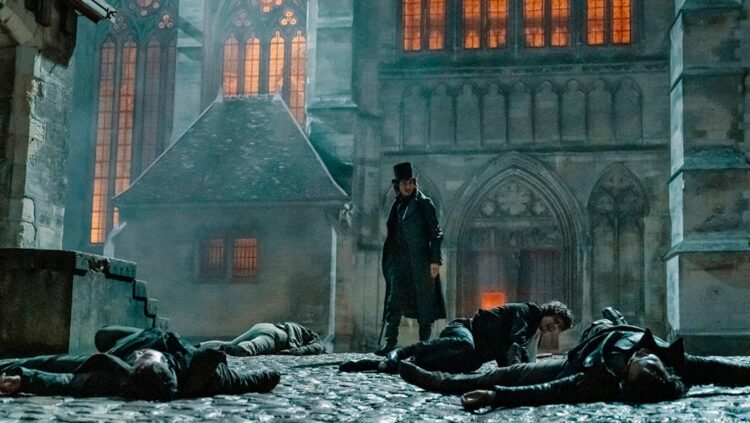

While watching the latest take on Alexandre Dumas’ literary classic, this time by directors Alexandre de La Patellière and Matthieu Delaporte (who just adapted Dumas’ The Three Musketeers in 2023), I wondered if I was enjoying myself for the wrong reasons. With a high budget (making it the most-expensive French film of 2024), a starry cast, and all the grandeur of a full-blown cinematic epic, The Count of Monte Cristo is big, blockbuster filmmaking of the French kind. And while these large-scale productions typically get the life taken from them by committee in Hollywood, this film’s stone-faced commitment to executing such silly spectacle makes for an uneven, mostly good time.
Directors de La Patellière and Delaporte, who also wrote the screenplay, keep the general story largely the same, with various tweaks to characters and subplots that streamline the narrative (even its nearly three-hour runtime wouldn’t be enough to cover the entirety of its source). In 1815, young sailor Edmond Dantès (Pierre Niney), the son of a poor servant, has been promoted to captain after rescuing a drowning woman during an expedition and is about to marry his fiancée Mercédès (Anaïs Demoustier). But his promotion was the result of the firing of cruel captain Danglars (Patrick Mille), who takes revenge on Edmond by framing him as a supporter of the exiled Napoleon Bonaparte. Danglars’ scheme ropes in two others: Fernand de Morcerf (Bastien Bouillon), Edmond’s best friend who betrays him as he wants Mercédès for himself, and Villefort (Laurent Lafitte), the prosecutor who makes Edmond the fall guy for his Bonapartist sister. Edmond gets shipped off to spend his life in solitary confinement at an island prison while everyone else believes he’s dead.
Amazingly, it only takes a half-hour or so to zip through all of that table-setting, and another half-hour to deal with Edmond’s time at prison. Four years into his sentence he meets Abbé Faria (Pierfrancesco Favino), a prisoner with a highly-educated background who accidentally digs an escape tunnel into Edmond’s cell. Faria spends the next decade teaching Edmond everything he knows, including the location of a vast, hidden treasure on the island of Monte Cristo. Faria dies in a digging accident, but Edmond escapes, finds the treasure, and heads back to France to enact what might be the most expensive revenge plot of all-time.
It’s obvious that de La Patellière and Delaporte want to get to what they consider the meat of the story, which is watching Edmond use his unlimited funds to play life on God mode. They make that evident when the newly freed Edmond walks into a church, looks upward, and declares, “From now on, I reward and I punish”––a moment delivered with so much dramatic flair it’s difficult not to laugh at its absurdity. That’s only the beginning of the film’s hilarious, enthralling second act, where Edmond assumes the title role and begins building out his master plan, all of it filmed like a cross between Mission: Impossible and a comic-book movie. If you’re the kind of person who can go along with the camera pushing in on Edmond’s face as the score swells and he states “I am The Count of Monte Cristo,” this is the film for you.
Of course, much has changed over the 15-or-so years since Edmond was imprisoned, and now his three enemies have climbed the ranks to the top tier of French society. Edmond recruits two teenagers to form his own ragtag team: Andrea (Julien de Saint Jean), the abandoned bastard son of Villefort tasked with taking his father down, and Haydée (Anamaria Vartolomei), a gorgeous young woman with a mysterious past who’s supposed to seduce Albert (Vassili Schneider), the teenage son of Fernand de Morcerf and, much to Edmond’s disappointment, Mercédès. All of these moving parts eventually click into place, but there’s never any doubt that Edmond is in full control at all times.
Much of the fun in this section comes from the outrageous amount of opulence on display, and the grand, sweeping direction that’s more than happy to indulge in all of it. Trying to avoid being found out by his enemies? Not a problem for Edmond, who has a supply of wigs and face masks to don multiple disguise, to the point where things veer dangerously close to Mike Myers territory; when he dresses as a fake British Lord to dupe Villefort, it’s hard not to think of this as a refined, French take on Austin Powers’ Fat Bastard. Want to impress your new, upper-class acquaintances to get into their social circle? Just go build a villa with an elaborate gear-and-pulley system in the walls so you can transform a room into a shooting range with the press of a button. Found out Villefort carries a terrible secret that happened years ago at a pied-à-terre? Simply buy the place and invite him over for a dinner party to psychologically torment him. There are many ways one could have realized the potential of a man able to spend hundreds of millions of dollars to get even; de La Patellière and Delaporte’s choices are maximalist and gleefully sadistic, and their film is all the better for it.
Unfortunately, not everything can be fun and games, and much of The Count of Monte Cristo’s final act stumbles as it leans into sappy romance and character drama. Part of the issue is that, for the most part, this film has no real interest in engaging with the source beyond materialist enjoyment. There’s a bit of hypocrisy in telling a story about an ordinary man who infiltrates high society to take them down using his education, wit, and sheer self-determination, then filming it in such a lavish way that you can practically see the Euros on the screen. But that’s where the escapist part of escapist entertainment kicks in; thus attempts to grapple with actual ideas fall flat and lead to a disappointing climax. For a good stretch of time, though, The Count of Monte Cristo is a prime example of popcorn fun, even if its filmmakers might have not intended for it to be laughed at as much as I did. But whether it’s for the right or wrong reasons, a good time is still a good time.
The Count of Monte Cristo premiered at the 2024 Fantasia International Film Festival.
The post Fantasia Review: The Count of Monte Cristo is a Silly Yet Mostly Good Time first appeared on The Film Stage.



